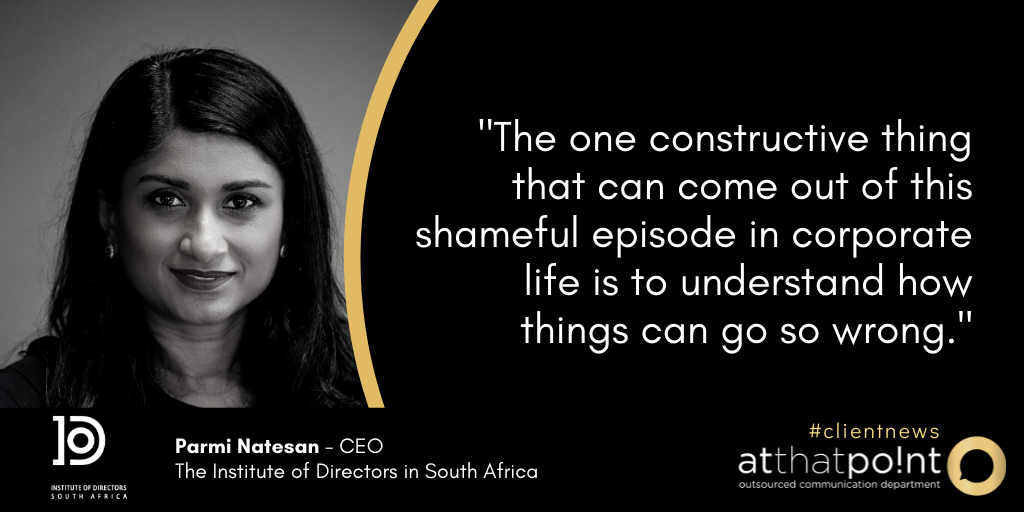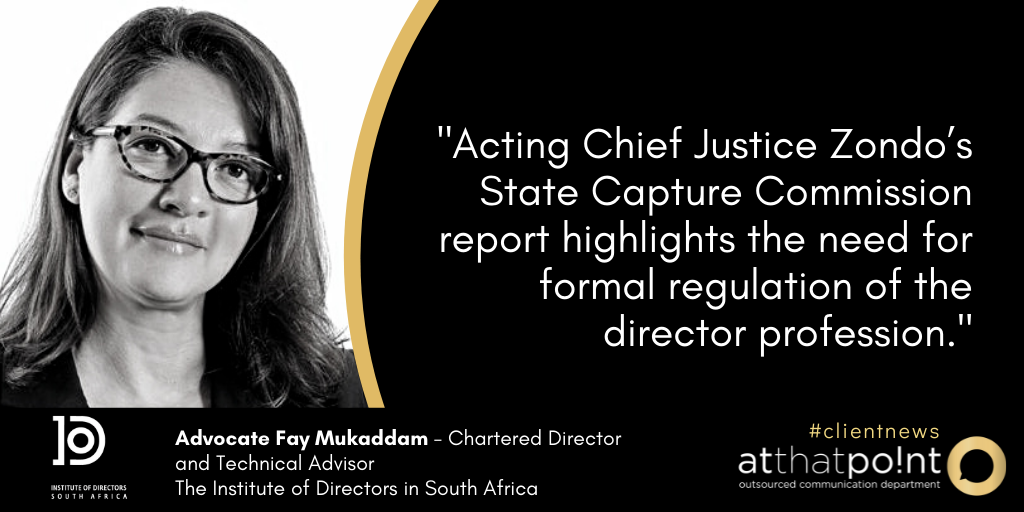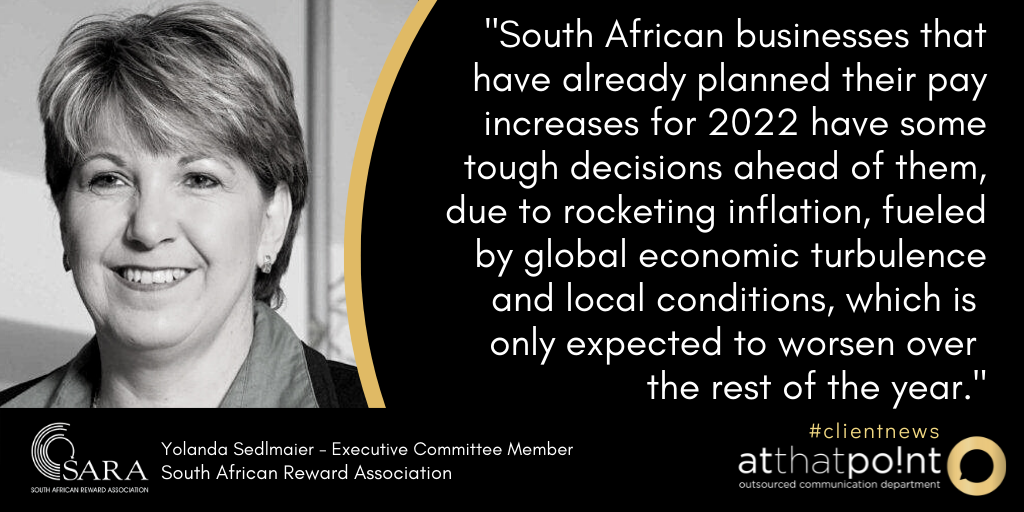 In detailing some of the crimes and misdemeanours that enabled state capture, the Zondo Commission’s report is in fact offering office-bearers across business and society a morality tale. In this spirit, the assessment of the performance of the erstwhile Chair of South African Airways, Dudu Myeni, acts as a case study of how important the role of the Board Chair is, and how not to do the job, argues Parmi Natesan, CEO of the Institute of Directors in South Africa (IoDSA). “Myeni’s tenure as Chair of SAA should be seen as an object lesson that all current and future Board Chairs should take to heart,” she says. “The one constructive thing that can come out of this shameful episode in corporate life is to understand how things can go so wrong.” Natesan says that key lessons can be drawn from the Zondo Commission’s report on Myeni’s tenure as Chair: Criteria and process are critical for the appointment of leadership positions on boards. The Report states that Myeni was appointed as Chair despite being an underperforming director. All board members, and particularly the Chair, need to be appointed in terms of rigorous criteria. “The IoDSA maintains that the primary role of the Chair is to lead the Board and set its tone, which in turn sets the tone for the whole organisation,” she notes. “Political connections are wholly irrelevant when it comes to ascertaining an individual’s fitness to serve in this critical leadership position. “It’s clear that SAA suffered from the same problem as other state-owned enterprises—undue political interference not only in the appointment of senior leaders but also in bypassing basic governance such as, in this case, holding the Chair to account.” As the Report makes clear, there were several attempts by the Board to seek redress on Myeni’s performance, but they came to nothing because she was protected by the political establishment. The Chair must have the respect of the rest of the Board. Without a proper voting process, it is unlikely that the Chair would have the Board’s respect and support, and he or she would thus be ineffective as a leader. As the Report makes clear, Myeni ruled by creating a climate of fear and suspicion that discouraged other Board members and executives from raising the alarm. In such a case, clearly, the Board was effectively dysfunctional and thus wrong decisions were repeatedly taken. Chairs must understand and fulfil their role. The Report makes the point that Myeni overstepped her mandate as Chair. In particular, she made a “series of operational choices at SAA that saw it decline into a shambolic state”. The first point to make is that Boards, and their Chairs particularly, are not supposed to involve themselves in operational matters, which are the preserve of management. The Chair’s role is strategic, and primarily involves ensuring that the Board functions optimally in fulfilling its oversight role. “This section of the Zondo Commission Report graphically illustrates how important the Chair is as the apex of governance within any organisation, and thus how destructive an ineffective or downright malign Chair can be,” Natesan concludes. ENDS MEDIA CONTACT: Idéle Prinsloo, [email protected], 084 587 9933, www.atthatpoint.co.za For more information on the IoDSA please visit: Website: www.iodsa.co.za Twitter: @The_IoDSA LinkedIn: Institute of Directors South Africa Company Page Facebook: Institute of Directors South Africa
0 Comments
 “Acting Chief Justice Zondo’s State Capture Commission report highlights the need for formal regulation of the director profession,” says Advocate Fay Mukaddam, Chartered Director (SA) and Governance Specialist at the Institute of Directors South Africa (IoDSA). As examples, Mukaddam points to the first volume’s allegations of gross mismanagement at SAA and its chairperson at the time eventually being declared a delinquent director by the courts. “While legal action can be taken to prohibit an incompetent or criminal director from serving on any boards in the future, this is effectively closing the stable door after the horse has bolted,” she says, insisting that early prevention is better than eventual punishment. A flawed system What stands out in the report is cadre deployment that saw people appointed to boards in SOEs and public sector entities because of their political connections rather than their fitness as directors. It is evident that they often did not understand or respect their mandate and either neglected or ignored their obligation to the organisation and the law. As a result, they allowed poor performance to infect the corporate culture they were meant to heal and led their organisation to ruin. This signals a flawed recruitment, screening, selection and appointment process and a lack of appreciation for what the roles and responsibilities of a director and board are. "If one doesn't understand what they are elected to do, how can they acquit themselves of their fiduciary duties?" asks Mukaddam. It also appears that, due to their questionable appointment, they were not subjected to the same performance interventions or rehabilitation processes as everyone else. The impact of poor directors SAA is a prime example of what happens when even a few poor directors are appointed to boards. Unfortunately, director acumen and commitment to their duties vary widely across organisations in both the public and private sectors, and low performance can go unnoticed until it is too late. “Professional directors as a collective have a significant impact on the economy, yet almost anyone can become a director without possessing the level of competency essential to their office,” says Mukaddam. The vetting process is largely left to the incumbent board or the vote of the organisation’s shareholders. Mukaddam suggests that this process is unsustainable, especially in developing countries like South Africa where robust policy is critical to economic recovery. A better approach “It is long past due that an independent regulator is empowered to accredit incoming directors against global professional standards, hold them accountable for misconduct, and formalise their continuous professional development on pain of being disqualified,” states Mukaddam. Other significant professionals, like doctors, auditors or attorneys, are required to pass a bar exam or professional evaluation before being allowed to practice. They are also subject to the disciplinary oversight of their professional body and must commit themselves to monitored lifelong learning. Yet none hold more sway over their nation’s prosperity than public and private professional directors. “A regulator, supported by government and the private sector, is far more effective than a long and difficult legal battle for a delinquency judgement after an organisation is already crippled,” says Mukaddam. ENDS MEDIA CONTACT: Idéle Prinsloo, 082 573 9219, [email protected], www.atthatpoint.co.za For more information on the IoDSA please visit: Website: www.iodsa.co.za Twitter: @The_IoDSA LinkedIn: Institute of Directors South Africa Company Page Facebook: Institute of Directors South Africa  Conclusions and recommendations made in part one of the state capture inquiry report align closely to a letter sent by the Institute of Directors South Africa (IoDSA) to the Zondo Commission in September 2021. The letter included recommendations on director competencies as well as the nomination and selection of directors. Section 580 of the state capture inquiry report mentions that the appointment of board members to SOEs “has proven to be problematic and does not represent the “robust and transparent” process recommended by King IV”. It also highlights the common “disjuncture between the fiduciary duties of SOE board members and the profile, skills and expertise of incumbents”. Section 582 and 583 further explain why “the national interest demands that state owned enterprises operate under efficient and professional leadership which requires that the appointment procedure is transparent, not driven by party political interests but made in accordance with objective criteria”. King IV makes a few important recommendations relating to the governance of the nomination process. The first of these is Recommended Practice 15: “the processes for nomination, election and ultimately, the appointment of members to the governing body should be formal and transparent”. Recommended Practice 16 states that “before nominating a candidate for election, the governing body should consider the collective knowledge, skills and experience required by the governing body, the diversity of the governing body, and whether the candidate meets the appropriate fit and proper criteria”. “While we welcome the alignment between the conclusions of the report and what the IoDSA has been saying for years, we are anxious to see the implementation of the recommendation on the professionalisation of directors,” says Parmi Natesan, CEO of the IoDSA. Professionalising directorship will not automatically eliminate incompetent or corrupt directors any more than professionalising medicine or engineering achieved that goal. It will, however, provide an objective framework for ensuring that directors have the required skills in terms of an objective competency framework, and that they can be disciplined in terms of a professional Code of Conduct. Alongside the professional skills a modern director needs, it is vital that individuals who serve as directors possess the necessary personal qualities. Directors should above all be ethical, independent and courageous. Courage and independence are particularly necessary because directors must put the interests of the organisation first, and this may mean going against the interests of the parties which appointed them or, indeed, their own interests. “Our highly respected director development programmes, Certified Director (SA) and Chartered Director (SA) designations, and governance advisory services are available immediately to support the implementation of the recommendations made by the Commission,” says Natesan. ENDS MEDIA CONTACT: Idéle Prinsloo, 082 573 9219, [email protected], www.atthatpoint.co.za For more information on the IoDSA please visit: Website: https://www.iodsa.co.za/ Twitter: https://twitter.com/the_iodsa LinkedIn: https://www.linkedin.com/company/institute-of-directors-in-southern-africa Facebook: https://www.facebook.com/TheIoDSA |
Archives
July 2024
Categories
All
|

 RSS Feed
RSS Feed